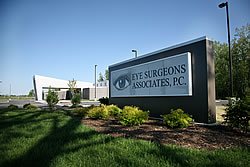By: John Frederick, M.D.
While many New Year’s resolutions aren’t fulfilled, here’s one that you should resolve to get done – get your eyes examined, especially if you can’t remember when your last exam was? Which begs the next question, how often do you need an eye exam?
This is a common question asked by patients. The answer depends on the patient’s age, risk factors for eye disease, and the presence of any ocular symptoms. Individuals presenting with ocular symptoms require immediate eye examinations.
Signs and symptoms requiring immediate eye examinations at any age include: loss, distortion, or diminishing of vision; pain in or around the eyes; excessive tearing or discharge from the eyes; swelling of the eyelids or protrusion of the eye; double vision; flashing of lights; halos around lights; floaters; sudden crossing or deviation of the eye; and changes in the color of the iris.
Individuals without symptoms, but who are at high risk of having eye disease, should have periodic eye examinations. Risk factors for eye diseases include: diabetes, hypertension, and any family history of glaucoma, cataracts, strabismus (crossed eye), amblyopia, retinal detachments, or other hereditary eye conditions.
Infants should receive an ocular screening exam by a pediatrician or family doctor while in the nursery. If the doctor notes any particular problem, very often the infant is then referred to an eye doctor that specializes in pediatric eye care. Every child should receive a preschool screening ocular examination by age 3. Amblyopia, the most common ocular problem among preschool children, can be largely corrected if detected early.
Many adults believe that because they don’t wear glasses or contacts that they don’t need eye exams, but this has no bearing on contracting age-related eye diseases. The new recommendation is for adults to get a baseline eye screening at age 40—the time when early signs of disease and changes in vision may start to occur. This is critical because with early detection and treatment, we can minimize the damage from potentially blinding diseases like glaucoma and diabetes that don’t present symptoms until some loss of vision has occurred. Based on the results of the initial screening, an ophthalmologist will prescribe the necessary intervals for follow-up exams. Patients at special risk of ocular diseases such as diabetes, hypertension and those with family histories of eye diseases should have annual eye exams.
The American Academy of Ophthalmology recommends the following intervals when no signs of disease or family history are present:
Complete eye exam at age 3. Prior to that, during regular pediatric wellness exams.
• Complete eye exam at age 5
• Every 1 – 2 years age 5 – 9
• Every 2-3 years age 10-18
• Age 20-29 years: At least once during this period.
Those with risk factors for glaucoma (people of African descent or those who have a family history of glaucoma) should be seen every 3-5 years.
• Age 30-39 years: At least twice during this period.
Those with risk factors for glaucoma (people of African descent or those who have a family history of glaucoma) should be seen every 2-4 years.
• Age 40-64 years: Every 2-4 years.
• Age 65 years or older: Every 1-2 years.
The above information is to serve as a guideline. Of course, there are always exceptions and if you have specific questions, you should discuss those with your eye doctor.
BIO: Dr. Frederick, with Eye Surgeons Associates, is board-certified with a fellowship in Pediatric Ophthalmology. Dr. Frederick practices at our offices in Bettendorf, Iowa and Rock Island, Illinois.
The material contained in this article is for informational purposes only and is not intended to be a substitute for professional medical advice, diagnosis, or treatment. Always seek the advice of your physician or other qualified health care provider.




